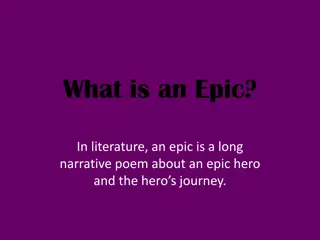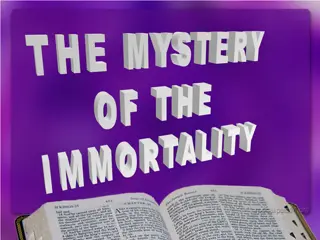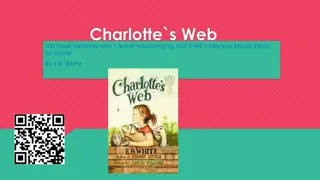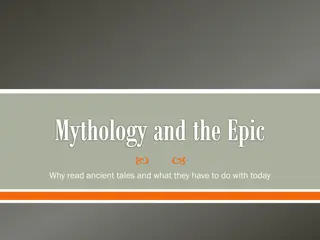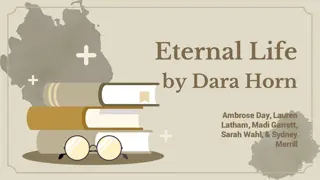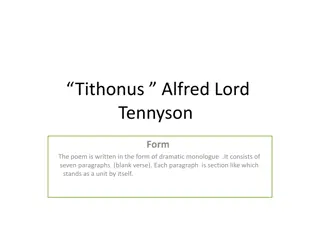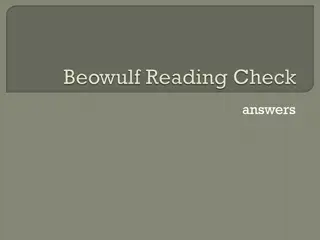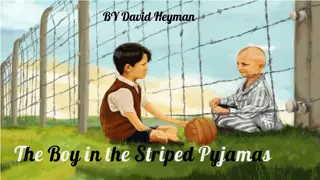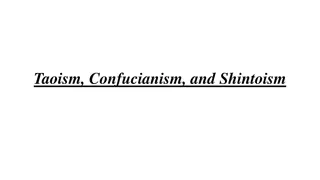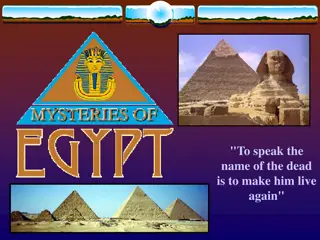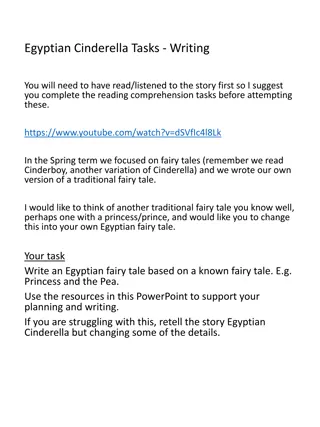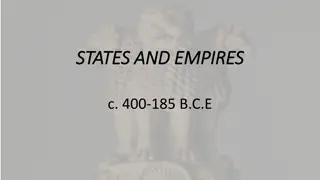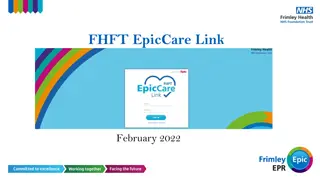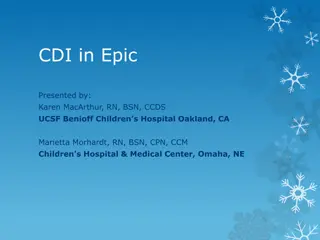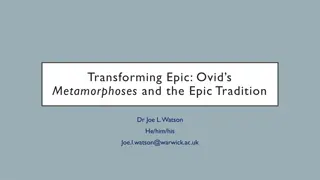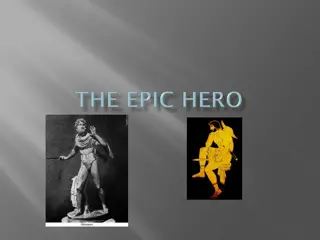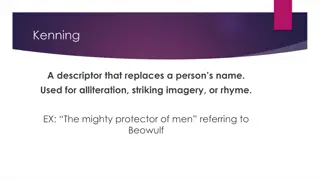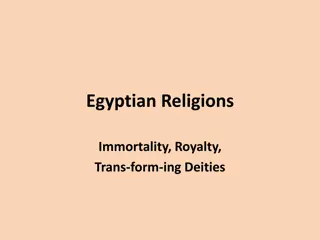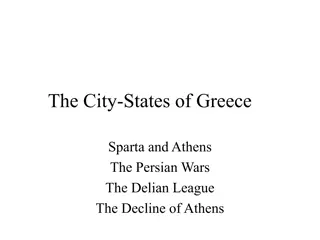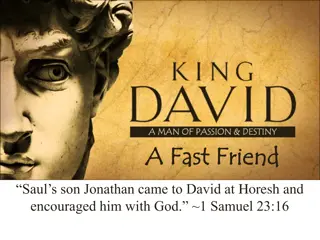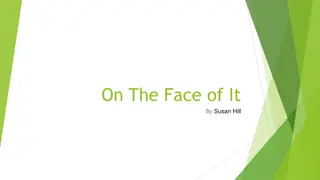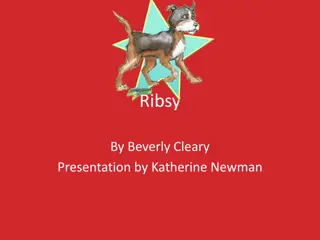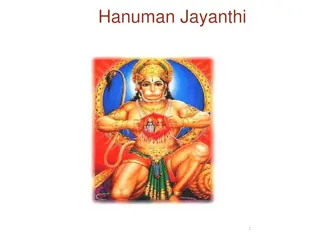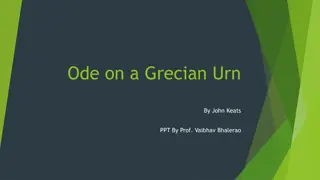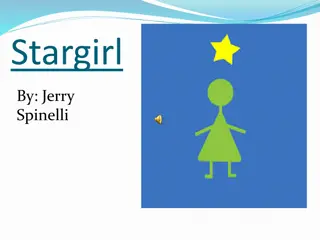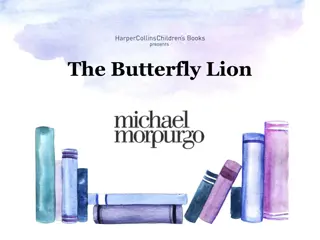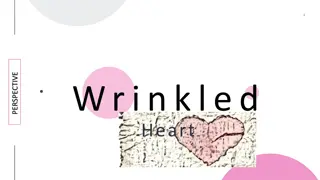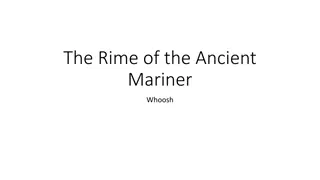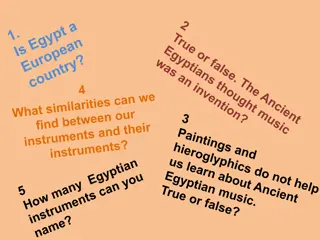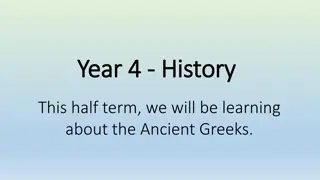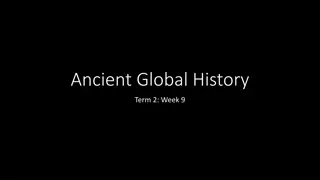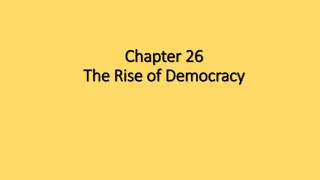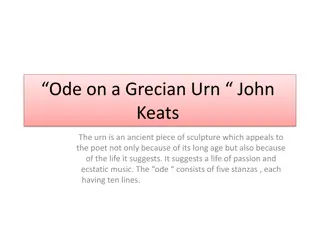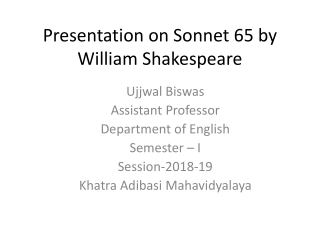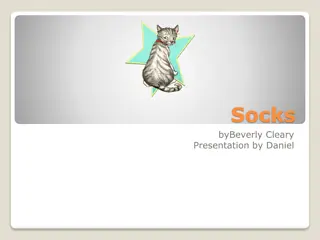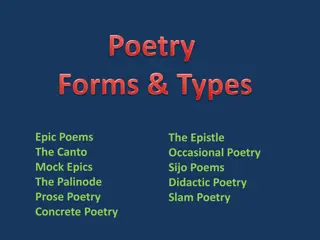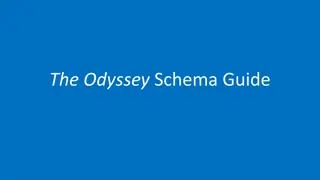The Epic of Gilgamesh: An Ancient Tale of Power, Friendship, and Immortality
The Epic of Gilgamesh recounts the legendary ruler of Uruk around 2700 B.C. The story revolves around themes of friendship, the quest for fame, the search for immortality, the clash between culture and nature, and the arrogance of power. It delves into the physical characteristics of Gilgamesh, his transformation from an arrogant ruler to a heroic figure, and the creation of Enkidu as a counterpart to challenge him.
Download Presentation

Please find below an Image/Link to download the presentation.
The content on the website is provided AS IS for your information and personal use only. It may not be sold, licensed, or shared on other websites without obtaining consent from the author. Download presentation by click this link. If you encounter any issues during the download, it is possible that the publisher has removed the file from their server.
E N D
Presentation Transcript
Introduction Gilgamesh real person, ruler of Uruk around 2700 B.C. Tales about Gilgamesh first transmitted orally. Earliest discovered written versions come from 18thand 17thcenturies B.C. Gilgamesh epic translated into number of Middle Eastern languages. Fullest version is in Assyrian, written probably in 668- 27 B.C. 2
Introduction Story put together from different tales about Gilgamesh that circulated for centuries. Why was it popular? Themes: Bonds of friendship Quest for fame Search for immortality Culture vs nature Arrogance of power 3
Tablet I Prologue Gilgamesh s accomplishments (1-29): wise in all things Built the walls of Uruk. Built the temple to the gods Anu and Ishtar with kiln- dried brick . Recorded his hardships on stone Praise for the heroic warrior Qualities of a good ruler 4
Tablet I Physical characteristics (30-60) stature renowned charging wild bull mighty floodwall furious flood-wave wild calf of Lugalbanda, his father perfect in strength uncannily perfect 5
Tablet I Physical characteristics (30-60) singled out from the day of his birth two thirds divine, one third human Large feet Long stride Long beard and hair perfection in height ideally handsome 6
Tablet I Gilgamesh not at first good ruler Arrogance of power Abuses his subjects Lords over Uruk like a wild bull, rampage fiercely Abuses the young men Takes other s wives and daughters 7
Tablet I How to deal with an arrogant ruler? Why are some rulers arrogant toward their subjects? Modern examples Solution: Give Gilgamesh opportunity to perform heroic deeds Women complain to the goddesses, they ask Anu to do something about it. 8
Tablet I The birth goddess Aruru creates Enkidu out of clay as an opponent for Gilgamesh Let them contend with each other, that Uruk may have peace Enkidu (105-112): Body covered with hair Head hair like a woman Looks like an animal Feeds on grass with animals 9
Tablet I Enkidu (105-112): Lives with animals People and Enkidu both created by the same goddess. What makes humans different from animals? 10
Tablet I How to get Enkidu to join Gilgamesh? Excuse: Enkidu interfering with a hunter s traps Hunter s father s advise: Get Gilgamesh to take care of Enkidu Get the prostitute Shamhat to seduce Enkidu Encounter with Gilgamesh may lead to the death of one or the other Encounter with the prostitute will lead to civilizing and weakening Enkidu 11
Tablet I Shamhat encounters a human-man (178) Shamhat appeals to Enkidu s human side After his encounter with Shamhat, Enkidu loses his animal characteristics (becomes limp) But has gained reason and expanded his understanding (199-202) In many myths sexual knowledge connects with civilization. How? Are women and sex then responsible for the civilization of humans? 12
Tablet I At this point Gilgamesh is part god, part man. Enkidu is part animal part man. As the story progresses they both become more of what the society expects of them as men. Shamhat: You are handsome, Enkidu, you are become like a god . (207) How? Enkidu wants to meet Gilgamesh: He was yearning for one to know his heart, a friend Friendship is a human characteristic 13
Tablet I Shamhat describes Uruk and Gilgamesh to Enkidu. (224-239). Civilized place where civilized men dwell. Glorification of Uruk and humankind Gilgamesh dreams, his mother interprets the dreams: Gilgamesh will meet Enkidu. Forshadowing. (263-274) He will be mighty in the land, strength will be his, Like the force of heaven, so mighty will be his strength. You will fall in love with him and caress him like a woman. He will be mighty and rescue you, time and again. 14
Tablet I Shamhat was telling the dreams of Gilgamesh to Enkidu, Each was drawn by love to the other. (302-305) See questions for Tablet I: http://www.auburn.edu/~mitrege/ENGL2200/Gilgamesh/tab let-1-questions.html 15
Tablet II Shamhat begins the process of civilizing Enkidu For six days, seven nights Enkidu was aroused and flowed into Shamhat . (3) Shamhat clothes Enkidu. Compare Adam and Eve. (20) Learns how to eat bread and drink beer. (33-37) Washes his body with water. Anoints himself with oil (perfume) Hunts animals 16
Tablet II Now a human, Enkidu is ready to meet and challenge Gilgamesh. After a fierce fight, They kissed each other and made friends. Male bonding? Gilgamesh proposes that they go on a quest to kill the monster Humbaba. 17
Tablet II Themes Facing mortality. (180-188). Gilgamesh: The gods dwell forever in the sun, People s days are numbered, Whatever they attempt is a puff of air Search for eternal fame. (192-195) If I fall on the way, I ll establish my name: Gilgamesh, who joined battle with fierce Humbaba (they will say). I must establish eternal fame 18
Tablet II Protection of nature. In order to safeguard the forest of cedars, Enlil has appointed him (Humbaba) to terrify the people (253-254) See questions for Tablet II: http://www.auburn.edu/~mitrege/ENGL2200/Gilgames h/tablet-2-questions.html 19
Tablet III The hero going on a quest, Gilgamesh asks for his mother s blessing: I travel a distant road, to where Humbaba is, To face a battle unknown, To mount a campaign unknown (25-27) Ninsun (Gilgamesh s mother) asks the god Shamash (the hero s helper) to protect Gilgamesh in his journey. Summoning the oracle. (119-128) 20
Tablet III The journey of Gilgamesh is the archetypal journey of the hero. Quest often takes place at the edge of the world. Glory is the traditional epic reward. Gilgamesh and Enkidu encourage each other to face death and their mortality. 21
Tablet IV Formulaic language detailing the stages of the journey. Three dreams prophesy. (1-70) Reach the edge of the forest, hear the guardian of he forest and Humbaba. (200-204) Gap: Enkidu s arm probably crushed in fight with the guardian of the forest. (218-219) Gilgamesh: Let the paralysis leave your arm, let weakness quit your knees, Take my hand, my friend, let us walk on together. 22
Tablet IV Series of obstacles the hero must face 0n his journey. Result? Those two will have established fame down through the ages. (226) 23
Tablet V Description of the forest, dwelling of the gods , paradise, Agreeable is its shade, full of pleasures (1- 10) Meeting Humbaba insults Gilgamesh and Enkidu. (26-37) Gilgamesh defeats Humbaba with the help of Shamash. Humbaba begs for his life. Enkidu urges Gilgamesh to kill him. Why? 24
Tablet V Establish your reputation for all time: Gilgamesh who slew Humbaba Cut trees and build door for Enlil. Why? Lumber very important for this part of the world. 25
Tablet VI Return to Uruk. New status for Gilgamesh that results from his quest. Ishtar s offer to Gilgamesh. Gilgamesh s refusal and insult: You are (32-42) Who were Ishtar s former lovers and what had she done to all of them? Ishtar demands revenge, asks Anu for the Bull of Heaven. 26
Tablet VI The bull is the next insurmountable challenge for Gilgamesh and Enkidu. Description of what he can do. (116-124) Gilgamesh and Enkidu cooperate in killing the bull. Last physical challenge. (131-144) Enkidu insults Ishtar again by throwing the high of the animal to Ishtar. Relationship between the gods and humans. One should not condemn the gods. Gilgamesh s speech to the women. (171-176) 27
Tablet VII Death of Enkidu Meditation on the value of civilization. Gods decide Enkidu must die for disobeying them: Killed Humbaba Insulted Ishtar Killed the Bull of Heaven Enkidu blames civilization for his fate. Shamash: Friendship with Gilgamesh was worth being civilized and dying. 28
Tablet VII Triumph of the value of civilization. Eternal glory is worth dying for. (105-110) Enkidu s dream of the afterlife. Before Enkidu dies he regrets dying in bed rather than in the battlefield. (185-186): I feared the battle but will die in my bed, My friend, he who falls quickly in battle is glorious 29
Tablet VIII Gilgamesh s struggle to come to terms with death. How to live life with the knowledge of death. Funeral hymn for Enkidu. (1-40) Lament. Loss of a friend. Funeral right for a hero. Gifts for the rulers of the afterworld. (93-139) In seeing Enkidu s fate Gilgamesh sees his own fate. 30
Tablet IX Gilgamesh realizes that he too will die and become as Enkidu is. (3) Shall I not die? Am I not like Enkidu Determined to find immortality. Quest for immortality. Confrontation of a human being with the powers of death. Gilgamesh goes in a search of Utanapishtim, the only man endowed with eternal life. 31
Tablet IX Shamash: The eternal life you are seeking you shall not find (24) Gilgamesh: Darkness is infinite, how little light there is! When may the dead see the radiance of the sun? Scorpion monsters, guardian s of the sun s tunnel. Why doesn t Gilgamesh fight them? On the other side is the something like the Garden of Eden. (116-132) 32
Tablet X Siduri the tavern keeper hero s helper. Gilgamesh afraid to die, like Enkidu. Siduri s advice. Recipe for true happiness? (82-91) Ur-Shanabi the ferryman takes Gilgamesh to Utanapishtim. Utanapishtim chides Gilgamesh for his self-pity. (285- 295) The gods have favored him. Compare yourself to the fool who has nothing. 33
Tablet X No one dead has greeted a human in this world. The gods ordain destinies for mankind. The gods established death and life. They did not reveal the time of death. 34
Tablet XI What does it take to become immortal? How did Utanapishtim alone escape the universal fate of the human race? (5-8) Search for knowledge about human nature. Story of the flood. Enlil hates the fact that humans are just making too much noise. Conflict between Ea and Enlil: was the flood fair? (185- 200) What to do with Utanapishtim? 35
Tablet XI Why does Gilgamesh deserve to have eternal life, and why should the gods grant it? (210-211) Utanapishtim proposes a test for Gilgamesh. Gilgamesh should regain his place as human, throw away animal skins, wash. Reminiscence of Enkidu joining civilization. (250-265) Last chance for Gilgamesh to become immortal with the plant of reguvination. Gilgamesh returns to Uruk. 36
Tablet XI Gilgamesh takes his rightful place as the King of Uruk, no longer obsessing about death. Proud of his city. 37



